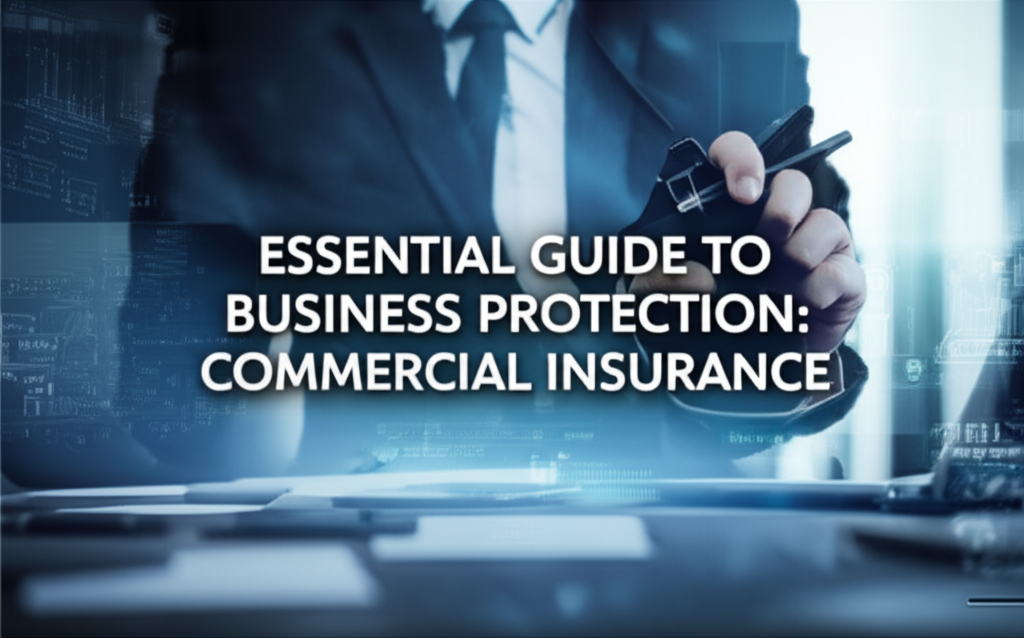In today’s fast-paced business world, protecting your enterprise is more crucial than ever. Imagine spending years building your dream company only to face unforeseen risks that could threaten its very existence. Does that thought keep you up at night? You’re not alone. Many entrepreneurs and business owners grapple with the potential hazards lurking around every corner. But here’s the good news: commercial insurance can serve as your safety net. In this essential guide, we’ll unlock the benefits of business protection through commercial insurance, guiding you through its various forms and how they can safeguard your business.
In this article, you’ll discover what commercial insurance is, its key components, and the immense benefits it provides. We’ll explore real-world examples and practical applications to illustrate how insurance can help you navigate the unpredictable landscape of business. By the end, you’ll be equipped with actionable insights that can help you make informed decisions about protecting your business. So, let’s dive in!
Understanding Commercial Insurance
Commercial insurance is a broad term that encompasses various types of insurance products designed specifically for businesses. These policies help mitigate risks associated with operating a business, from property damage to liability claims. In essence, commercial insurance acts as a safety net, ensuring that your business can weather storms, both literal and metaphorical.
Now, you might be wondering: why is commercial insurance necessary? Well, every business, regardless of size or industry, is exposed to risks. Whether it’s a natural disaster, employee injury, or a cyber-attack, the possibilities are endless. Commercial insurance not only protects your physical assets but also shields you from financial losses that could cripple your operations.
Key Components of Commercial Insurance
Commercial insurance is not a one-size-fits-all solution. It comprises various types of coverage tailored to meet the unique needs of different businesses. Let’s explore some of the key components:
1. General Liability Insurance
This is the most common type of commercial insurance. It protects your business from claims of bodily injury, property damage, and personal injury. For instance, if a customer slips and falls in your store, general liability insurance can cover medical expenses and legal fees.
2. Property Insurance
Property insurance safeguards your business assets against risks such as theft, fire, or natural disasters. It can cover your physical location, equipment, and inventory. Imagine a fire destroying your office; property insurance would help you recover and rebuild.
3. Workers’ Compensation Insurance
If you have employees, workers’ compensation insurance is essential. It provides coverage for medical expenses and lost wages if an employee is injured on the job. Not only is it often legally required, but it also fosters goodwill among your workforce.
4. Professional Liability Insurance
Also known as errors and omissions insurance, this coverage is crucial for service-based businesses. It protects against claims of negligence or inadequate work. For example, if a client claims that your consulting services led to financial loss, professional liability insurance can cover the legal costs.
5. Business Interruption Insurance
This type of insurance helps you recover lost income during a period when your business is unable to operate due to a covered event, such as a fire or flood. This can be a lifesaver in maintaining cash flow while you get back on your feet.
Benefits and Importance
Now that we understand the key components, let’s delve into the benefits of investing in commercial insurance. Here are some compelling reasons to consider:
1. Financial Protection
The most obvious benefit of commercial insurance is financial protection. Without it, a single incident could lead to crippling financial losses. Insurance helps ensure that your business can recover and continue operating, even after facing significant setbacks.
2. Risk Management
Commercial insurance is a fundamental part of risk management. By identifying potential risks and obtaining appropriate coverage, you can proactively address challenges before they escalate into crises. This can lead to better decision-making and greater peace of mind.
3. Enhanced Credibility
Having commercial insurance can enhance your business’s credibility. Clients and customers often prefer to work with insured businesses, as it demonstrates professionalism and a commitment to responsibility. This can give you a competitive edge in your industry.
4. Legal Compliance
In many regions, certain types of insurance, such as workers’ compensation, are legally required. By securing the necessary coverage, you not only comply with the law but also protect yourself from potential lawsuits and penalties.
5. Attracting and Retaining Talent
Employees are more likely to join and stay with a company that provides a safe working environment and protects their interests. Offering workers’ compensation and other insurance benefits can increase employee morale and loyalty, leading to lower turnover rates.
Practical Applications
Let’s look at some real-world scenarios that illustrate how commercial insurance can be a game-changer for businesses:
Case Study 1: Retail Store Fire
Imagine a local retail store experiences a devastating fire that destroys inventory and damages the building. With property insurance, the store owner can file a claim to cover the costs of repairing the building and replacing lost inventory. This allows the business to reopen quickly and continue serving customers.
Case Study 2: Consultant’s Mistake
Consider a consultant who provides strategic advice to a startup. If the startup suffers losses due to the consultant’s recommendations, they may file a lawsuit. Without professional liability insurance, the consultant could face significant legal expenses. However, with the right coverage, the insurance can help cover legal fees and potential settlements.
Case Study 3: Employee Injury
A construction company experiences an employee injury on-site. Thanks to workers’ compensation insurance, the injured employee receives medical care and wage replacement during recovery. This not only protects the employee but also shields the company from potential lawsuits.
Frequently Asked Questions
What is commercial insurance?
Commercial insurance is a type of insurance designed to protect businesses from financial losses due to various risks, including property damage, liability claims, and employee injuries. It encompasses several types of coverage tailored to the unique needs of businesses.
Why do I need commercial insurance?
Commercial insurance is essential for protecting your business’s assets and ensuring financial stability in the face of unforeseen events. It can help you manage risks, comply with legal requirements, and enhance your business’s credibility.
How much does commercial insurance cost?
The cost of commercial insurance varies based on factors such as the type of coverage, your business’s size, industry, and location. On average, small businesses might spend between $500 to $3,000 annually, but it’s crucial to obtain quotes to find the best deal for your specific needs.
Can I customize my commercial insurance policy?
Yes, most insurance providers offer customizable policies. You can choose the types of coverage that best fit your business needs and adjust limits and deductibles accordingly. It’s essential to work with an insurance agent to tailor a policy that suits your unique risks.
What happens if I don’t have insurance?
If you don’t have commercial insurance, your business is exposed to significant financial risks. A single incident could result in costly lawsuits, property loss, or medical expenses that could devastate your finances. Essentially, operating without insurance puts your business’s future at jeopardy.
How do I choose the right commercial insurance provider?
When selecting a commercial insurance provider, consider factors such as the company’s reputation, customer service, range of coverage options, and claims process. Research reviews and seek recommendations to find a provider that meets your business’s specific needs. Don’t hesitate to ask questions and clarify any doubts before making a decision.
Conclusion
In conclusion, commercial insurance is a vital component of any successful business strategy. By understanding its key components and benefits, you can make informed decisions about the types of coverage that best protect your business. Remember, investing in commercial insurance is not just about compliance; it’s about securing your dream and ensuring your business can thrive amidst uncertainties.
As you embark on this journey to safeguard your business, take a moment to assess your unique risks and consider how commercial insurance can be your ally. Don’t wait for a crisis to occur—act now to protect what you’ve worked so hard to build. If you have any questions or need assistance, feel free to reach out. Together, we can navigate the complexities of commercial insurance and ensure your business is well-protected for the future!


